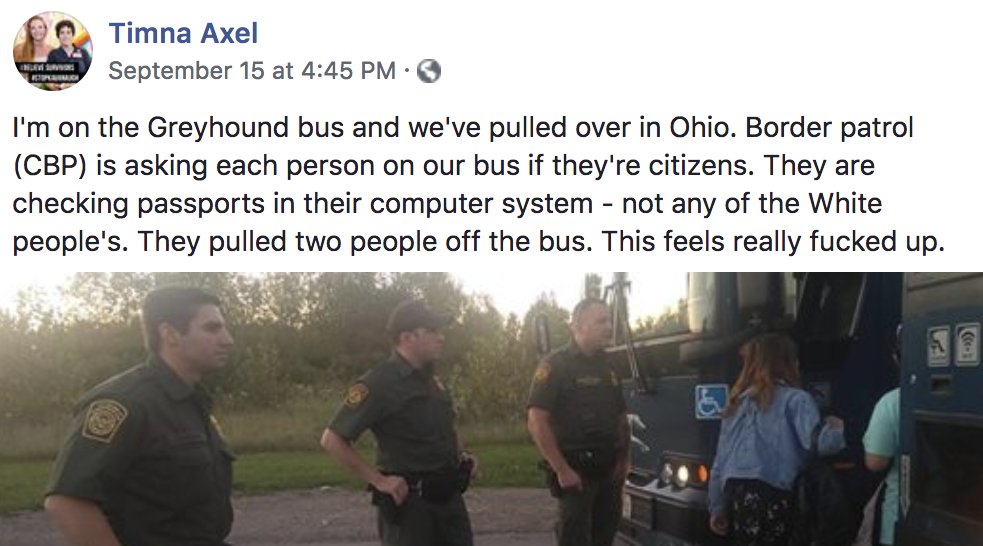Border Patrol is pulling (non-white) people off buses as far north as Ohio, and demanding proof of citizenship.
If you’ve ever watched The Hunt for Red October, you’ll recall that the Russian defectors discuss freedom in terms of a a lack of need for papers to travel:
Capt. Vasili Borodin: I will live in Montana. And I will marry a round American woman and raise rabbits, and she will cook them for me. And I will have a pickup truck… maybe even a “recreational vehicle.” And drive from state to state. Do they let you do that?
Captain Ramius: I suppose.
Borodin: No papers?
Ramius: No papers, state to state.
That’s all it takes to distinguish a free state from an oppressive one. “No papers.”
Obviously these are fictional characters… but no dialogue is wasted in film, especially not in a well-made one (it currently has a 7.6/10 on IMDb). It’s meant to highlight, to an American audience, the reasons that career military men from another superpower would risk their lives to defect to the United States. And this is what they gave the audience, characters who marvel at the ability to move about with no papers. In 1990 that was all that it took, because freedom to move about without papers or random police inspections has long been understood as a fundamental freedom.
If you’re a U.S. citizen, you likely take this right for granted today. (Do you carry proof of citizenship on you at all times?) It’s in the Fourth Amendment. The government does not have the right to “seize” you, or to search your “papers” or “effects”, unless they have a warrant or probable cause.
(In this case, they weren’t necessarily checking papers directly; if people lacked papers, they were reportedly checking passports online. But doesn’t that still require you to have papers, somewhere? What if you are a citizen who hasn’t gotten a passport? Are you not still “seized” while your passport status is electronically checked, anyway?)
Defenders of CBP love to claim that they have total authority to verify citizenship or legal status within 100 miles of the border. But that’s just not true. CBP are allowed to operate checkpoints, but the purpose of a checkpoint is to check everyone, not just people of a certain race. Otherwise they need at least reasonable suspicion of an immigration violation on board a vehicle before they can stop the vehicle and ask for papers. Outside of those limits, they still need probable cause or a warrant.
So, there are only a few possibilities here:
- CBP had a warrant or probable cause to search the entire bus. (This makes little sense, if the warrant covered all passengers, why are they only targeting the non-white passengers?)
- CBP had a warrant or probable cause to search for a specific person on the bus, and all the non-white people on the bus closely resembled the person they’re looking for. (I doubt this.)
- CBP stopped the bus looking for one person, and independently happened to develop reasonable suspicion or probable cause of an immigration violation by each non-white passenger on the bus during the stop, based on something other than their skin color. (This seems highly unlikely.)
- CBP stopped the bus at a checkpoint, but selectively seized and searched only the non-white passengers while declining to verify papers for white passengers at the same checkpoint (which was both racially discriminatory and unconstitutional).
You can tell where I’d place my money.

